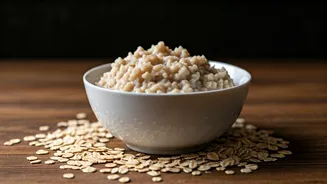Oats: A Superfood
Oats are a nutritional treasure trove, packed with soluble fiber, vitamins, and minerals. They are a complex carbohydrate and a great source of energy
that your body slowly releases. One of the main components of oats, beta-glucan, is a soluble fiber known for its remarkable effects on health. These fibers aid in lowering cholesterol levels, regulating blood sugar levels, and promoting gut health. Oats contain essential vitamins like thiamin, magnesium, and iron. Including oats in your diet will help you with overall wellness. The high fiber content in oats promotes feelings of fullness, which helps in weight management. Regular oat consumption can contribute to a balanced diet and overall improved health.
Heart-Healthy Benefits
Oats have a positive impact on heart health because of the high levels of soluble fiber, particularly beta-glucan. Beta-glucan helps lower cholesterol by binding with cholesterol-rich bile acids in the digestive system, which are then excreted. Regular consumption of oats can reduce the risk of heart disease and stroke by maintaining healthy cholesterol levels. Also, oats have the power to reduce blood pressure. The antioxidants in oats, called avenanthramides, can help prevent the accumulation of plaque in arteries. Including oats into your diet can be a proactive step towards cardiovascular health. Numerous studies show that people who consume oats regularly have a decreased risk of cardiovascular events, thus demonstrating their vital role in heart health.
Weight Management
Oats are a valuable component of any weight management strategy, largely because of their high fiber content. Fiber promotes feelings of fullness, and thus the consumption of oats helps regulate appetite and reduces overeating. Oats keep you feeling fuller for longer. This prolonged feeling of satiety can help you consume fewer calories throughout the day, which helps with weight loss. They are relatively low in calories and can be prepared in various ways, making them a flexible addition to your diet. Substituting oats for less nutritious breakfast options is a simple method to reduce your overall calorie intake and increase the nutritional value of your meals. Incorporating oats into your daily meals can contribute to long-term weight management and a healthier lifestyle.
Blood Sugar Control
The soluble fiber in oats, particularly beta-glucan, is important for regulating blood sugar levels, making them beneficial for people with diabetes or insulin resistance. Beta-glucan slows down the absorption of glucose from food into the bloodstream, preventing sharp spikes in blood sugar. Eating oats for breakfast can result in more steady blood sugar levels throughout the morning, which helps prevent energy crashes and improves overall well-being. Oats also have a low glycemic index (GI), which indicates that they do not cause significant changes in blood sugar levels. Regular consumption of oats can improve insulin sensitivity, supporting blood sugar management and decreasing the risk of type 2 diabetes. Oats are a great choice for a balanced diet.
Gut Health Boost
Oats act as a prebiotic, which means they feed the beneficial bacteria in your gut. They promote gut health by providing nourishment for the good bacteria that reside in the digestive tract. A healthy gut microbiome is crucial for overall health, as it aids with nutrient absorption, immune function, and digestion. The beta-glucan in oats helps in the production of short-chain fatty acids (SCFAs) that nourish the cells lining the colon and reduce inflammation. Oats can also ease constipation because of their high fiber content. Including oats in your daily diet can promote a healthy gut environment, leading to better digestion, improved nutrient absorption, and an overall better immune system. A balanced gut microbiome is vital to maintain good health.
Versatile Culinary Uses
Oats are not only highly nutritious but also very versatile in the kitchen. They can be prepared in many ways, from simple porridge to more elaborate dishes. Starting your day with a warm bowl of oatmeal, either plain or with fruits and nuts, is a great option. Oats can be used in baking to add texture and nutrients to muffins, cookies, and bread. They can be added to smoothies, granola, and energy bars, offering a convenient way to boost your daily fiber intake. Oats can also be used as a binding agent in veggie burgers or meatloaf. This versatility means you can incorporate oats into a range of meals and snacks, easily enhancing the nutritional profile of your daily diet.














